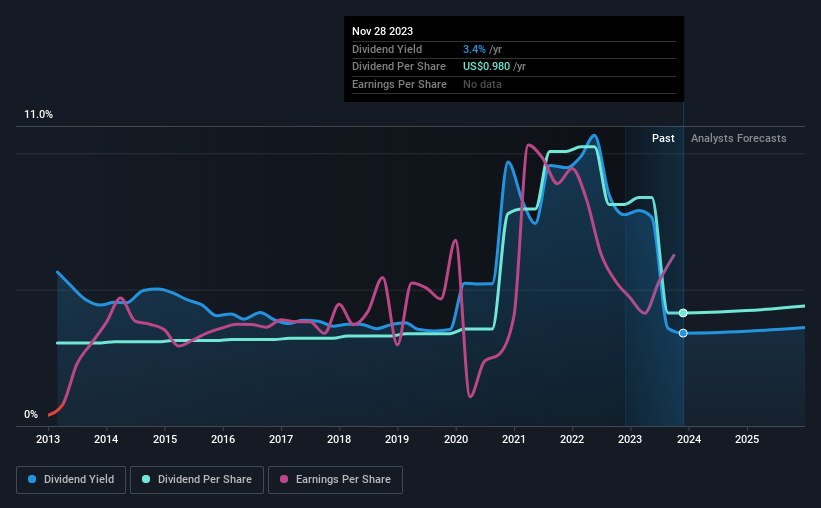Is It Smart To Buy Old Republic International Corporation (NYSE:ORI) Before It Goes Ex-Dividend?
It looks like Old Republic International Corporation (NYSE:ORI) is about to go ex-dividend in the next 4 days. The ex-dividend date is usually set to be one business day before the record date which is the cut-off date on which you must be present on the company's books as a shareholder in order to receive the dividend. It is important to be aware of the ex-dividend date because any trade on the stock needs to have been settled on or before the record date. This means that investors who purchase Old Republic International's shares on or after the 4th of December will not receive the dividend, which will be paid on the 15th of December.
The company's upcoming dividend is US$0.24 a share, following on from the last 12 months, when the company distributed a total of US$0.98 per share to shareholders. Looking at the last 12 months of distributions, Old Republic International has a trailing yield of approximately 3.4% on its current stock price of $28.78. Dividends are an important source of income to many shareholders, but the health of the business is crucial to maintaining those dividends. As a result, readers should always check whether Old Republic International has been able to grow its dividends, or if the dividend might be cut.
Check out our latest analysis for Old Republic International
Dividends are typically paid out of company income, so if a company pays out more than it earned, its dividend is usually at a higher risk of being cut. Old Republic International paid out a comfortable 30% of its profit last year.
Companies that pay out less in dividends than they earn in profits generally have more sustainable dividends. The lower the payout ratio, the more wiggle room the business has before it could be forced to cut the dividend.
Click here to see the company's payout ratio, plus analyst estimates of its future dividends.
Have Earnings And Dividends Been Growing?
Stocks in companies that generate sustainable earnings growth often make the best dividend prospects, as it is easier to lift the dividend when earnings are rising. If business enters a downturn and the dividend is cut, the company could see its value fall precipitously. This is why it's a relief to see Old Republic International earnings per share are up 9.6% per annum over the last five years.
Another key way to measure a company's dividend prospects is by measuring its historical rate of dividend growth. Old Republic International has delivered an average of 3.1% per year annual increase in its dividend, based on the past 10 years of dividend payments. We're glad to see dividends rising alongside earnings over a number of years, which may be a sign the company intends to share the growth with shareholders.
The Bottom Line
From a dividend perspective, should investors buy or avoid Old Republic International? It has been growing its earnings per share somewhat in recent years, although it reinvests more than half its earnings in the business, which could suggest there are some growth projects that have not yet reached fruition. We think this is a pretty attractive combination, and would be interested in investigating Old Republic International more closely.
In light of that, while Old Republic International has an appealing dividend, it's worth knowing the risks involved with this stock. To help with this, we've discovered 2 warning signs for Old Republic International (1 is significant!) that you ought to be aware of before buying the shares.
If you're in the market for strong dividend payers, we recommend checking our selection of top dividend stocks.
Have feedback on this article? Concerned about the content? Get in touch with us directly. Alternatively, email editorial-team (at) simplywallst.com.
This article by Simply Wall St is general in nature. We provide commentary based on historical data and analyst forecasts only using an unbiased methodology and our articles are not intended to be financial advice. It does not constitute a recommendation to buy or sell any stock, and does not take account of your objectives, or your financial situation. We aim to bring you long-term focused analysis driven by fundamental data. Note that our analysis may not factor in the latest price-sensitive company announcements or qualitative material. Simply Wall St has no position in any stocks mentioned.

